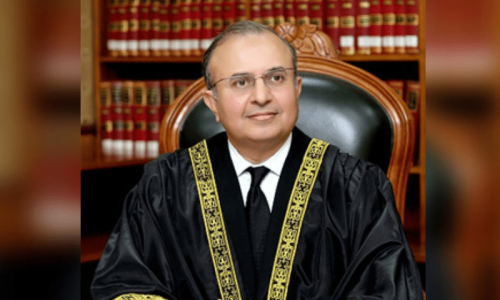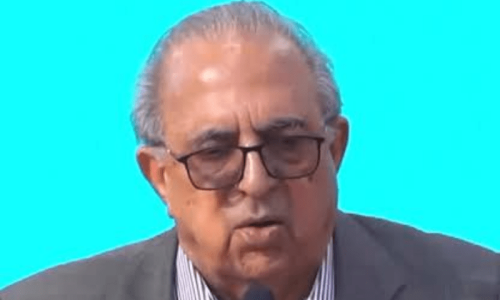ISLAMABAD: Justice Syed Mansoor Ali Shah, senior puisne judge of the Supreme Court, while deciding an appeal against the dismissal from service of a Punjab government employee, emphasised on Wednesday that judicial review is essential to prevent abuse of power, but courts must respect executive’s autonomy and discretion in managing its employees.
Highlighting the need to balance individual rights with broader public interest, Justice Shah said, “The judiciary should intervene only in cases of a clear illegality, arbitrariness or mala fide intent.”
The observation came on the challenge to the Lahore High Court’s Rawalpindi bench order in 2022 pertaining to the dismissal from service of Mohammad Nasir Ismail, an assistant at the Board of Intermediate and Secondary Education (BISE), Rawalpindi, under Section 5 of the Punjab Employees Efficiency, Discipline and Accountability Act, 2006 (Peeda) in 2013.
The LHC had rejected the plea raised by the petitioner who was charged for wilful absence from duty, inefficiency and misconduct as he remained absent from duty for 48 days without authorisation.
BISE directed to determine penalty imposed on employee sacked in 2013 for prolonged absence without authorisation
Justice Shah noted it was imperative to protect employees from unfair treatment, but judicial decisions should not undermine the broader objectives of maintaining an efficient and disciplined civil service. A well-functioning disciplinary system is essential for governance and courts must ensure that their rulings do not compromise the effectiveness of administrative oversight, explaining that unauthorised absence from duty disrupts public service delivery, weakens institutional discipline and undermines government efficiency, according to the judgement.
Justice Shah explained that imposition of a major penalty of compulsory retirement, however, failed to meet the test of proportionality, as it neither established a rational nexus between the misconduct and the severity of penalty nor considered less restrictive alternatives.
Subsequently, Justice Shah set aside LHC’s judgement to the extent of the penalty imposed but with a caveat that petitioner’s reinstatement should be subject to a fresh determination by the competent authority.
The court ordered the chairman of the BISE, Rawalpindi to revisit the petitioner’s case and impose a penalty proportionate to the gravity of the misconduct.
To facilitate the expeditious disposal of this matter, the apex court directed the petitioner to appear at 11am on March 19 before the competent authority, who after affording the petitioner an opportunity of hearing will decide the matter through a speaking order within a period of seven days.
Justice Shah also directed the BISE to submit a compliance report for the information of the Supreme Court.
However, the SC acknowledged that penalties under service laws serve multiple purposes in ensuring that civil servants adhere to ethical and professional standards. One of their primary functions is maintaining discipline and accountability. The credibility and efficiency of civil service could be severely compromised without accountability.
Another key objective of enforcing penalties is to prevent the abuse of power. In the absence of strict disciplinary mechanisms, bureaucrats may misuse their authority, leading to corruption, inefficiency and injustice. Such misconduct not only erodes public trust in institutions but also disrupts governance and service delivery. Penalties play a key role in ensuring efficiency and performance. The knowledge that disciplinary action may be taken in cases of negligence or misconduct incentivises civil servants to fulfil their responsibilities diligently.
Additionally, when the public sees that civil servants are held accountable for their actions, it helps in protecting public confidence in government institutions, the judgement emphasised. A transparent and fair disciplinary system assures citizens that government officials are working in their best interest.
The judgement also explained how civil service being the backbone of any government ensured continuity, stability and efficiency in governance and implement policies and maintain the institutional framework of the state.
Unlike political leadership that changes periodically, the civil service ensures uninterrupted functioning of government, providing institutional memory and stability, Justice Shah observed, adding that the civil servants were responsible for executing policies and programmes formulated by elected representatives, ensuring that governance reaches the grassroots level.
A fundamental characteristic of an effective civil service was impartiality and meritocracy, the judge explained, adding that a professional bureaucracy ensured that decisions were made based on merit rather than favouritism and political influence. “This independence fosters efficiency, fairness, and public trust in government institutions,” Justice Shah noted.
Published in Dawn, March 6th, 2025














































